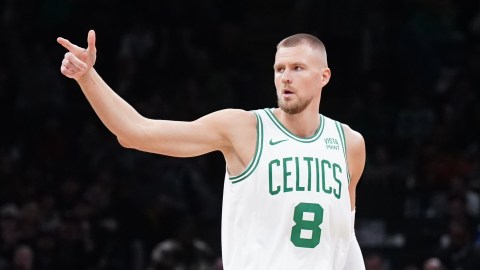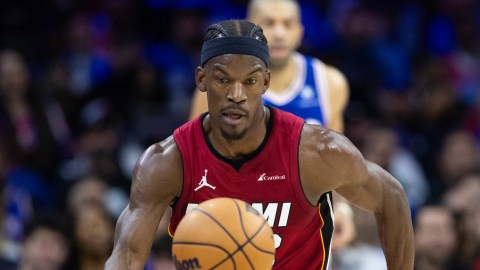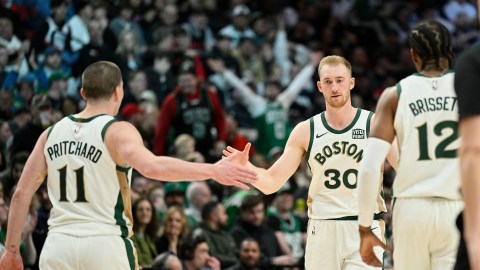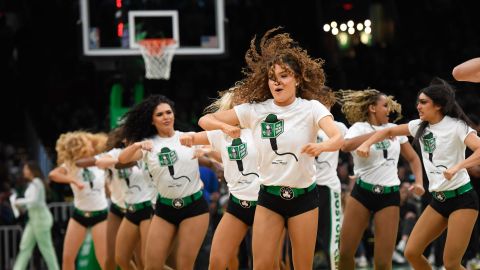 Jason Terry declined to tell reporters what was addressed in the locker room after the Celtics’ loss to the Grizzlies on Wednesday, when coach Doc Rivers took an abnormally long time to show up in the press room for his postgame news conference. The coach may have chewed out his players, or he might have pulled up a chair in the middle of the locker room for a team-wide heart-to-heart.
Jason Terry declined to tell reporters what was addressed in the locker room after the Celtics’ loss to the Grizzlies on Wednesday, when coach Doc Rivers took an abnormally long time to show up in the press room for his postgame news conference. The coach may have chewed out his players, or he might have pulled up a chair in the middle of the locker room for a team-wide heart-to-heart.
What Rivers assuredly did not tell his players, though, was to get younger — not only because it’s impossible, but because the Celtics’ age is irrelevant despite their current struggles.
As the Celtics’ slide stretched to four straight losses with only two wins in their last 10 games, it was tempting to blame old legs and weary bones. For sure, the Celtics are not the youngest bunch. With an average age of 28 years, 223 days, they are more likely to recall Motown Philly than to suffer from Bieber Fever. The problems that have plagued the Celtics have nothing to do with age, however, and everything to do with attention to detail in Rivers’ once-precise offensive and defensive systems.
“We didn’t play like a veteran team,” Rivers said Wednesday in the quote that sums up his team’s play since mid-December. “We played like a really young team that was rushed, and that’s what happens when you’re not winning games.”
Paul Pierce and Kevin Garnett were far from standouts against the Grizzlies, as the last four games have brought an end to the overall strong play provided earlier in the season by the two stars in their mid-30s. But to blame their age for this defeat, or for the preponderance of losses in the last month, sort of takes the Celtics as a whole off the hook.
A case in point on Wednesday was the third quarter. Brandon Bass, Avery Bradley, Rajon Rondo, Jared Sullinger and Jeff Green, none of whom can be called senior citizens from an NBA standpoint, each logged at least five minutes in that disastrous frame. Although the statistics suggested the Celtics defended better in the quarter — they held Memphis to 40 percent shooting from the field after allowing better than 61 percent before halftime — the breakdowns were still glaring, visually. They gave up tip-dunks to Tony Allen, scrambled haphazardly to contest 3-pointers by Rudy Gay and Mike Conley and often left the rookie Sullinger alone as the only defender who appeared to make the right rotations.
The second quarter was no work of art, either, but even after giving up 16 points in the paint in that period, the Celtics were able to salvage a nine-point deficit at the break. By the end of the third quarter, the Grizzlies’ lead had ballooned to 16 points, and it did not even feel that close.
As they say, age is undefeated. Yet just as old age does not always cause the death of a person, it is not always to blame for the death of a team. Age may make a player a step slow in closing out on a shooter, but it should not cause a player to completely fail to pick up a shooter in transition. It may prevent a big man from elevating that extra half-inch to block a shot, but it should not prevent a big man from being in the right place defensively. It may make it difficult to out-jump an opponent for a rebound, but it should not negate the value of boxing out.
These are the problems that plague the Celtics. Unlike magically shaving years off players’ ages, these matters are fixable. That is not to say they will be fixed — even fixable problems only get fixed through effort — but for the Celtics, age is far from the biggest reason they suddenly seem to have forgotten how to play.
Have a question for Ben Watanabe? Send it to him via Twitter at @BenjeeBallgame or send it here



